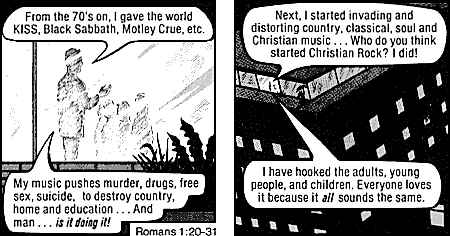|
Satanism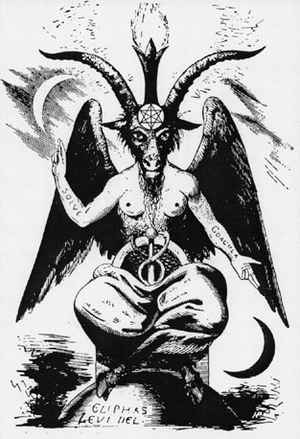 There are two types of Satanists in the world: the ones who worship Satan, and the ones who don't.
There are two types of Satanists in the world: the ones who worship Satan, and the ones who don't. If that seems counterintuitive to you, well, don't look at us. We didn't think it up. Satan was invented... uh, discovered... uh, let's start over. People first started talking about Satan around the third century B.C., starting in Jewish scriptures. The concept of Satan caught fire with Christianity. Given human nature, it's a lead pipe cinch that there have been some kind of Satan worshipers throughout most of the history of the concept, but it's difficult to estimate exactly how many, for the same reason it's difficult to estimate how many Communists were working in the State Department in the 1950s. Although there were some, the label "Satanist" became a catchall for any group of people whose beliefs offended the church of Rome. Gnosticism was the equivalent of Satanism in the eyes of the early church. So was Witchcraft. So too any form of Occultism. Freemasonry is still called Satanic by many Christians. When Christianity moved into a geographical region, it co-opted as much of the native religion as possible. Whatever remained was deemed Satanic. It's also tricky to draw the line between the historical practice of demonology, in which the forces of hell were invoked as servants, and Satanism, which is the worship of Satan.
Other early Gnostic sects did revere the figure of Satan specifically, but he wasn't the big red guy with the horns and the tail. Rather, Satan was represented in the context of the name Lucifer, which means "light-bringer." In these cosmologies, Lucifer was the enemy of the blind god, who created the world. By giving the apple to Eve in the Garden of Eden, Lucifer brought knowledge of good and evil (gnosis) to mankind. These short-lived sects of the second, third and fourth centuries were not Hollywood-style Satanists, with the robes and the goat heads and the Black Masses and the Rosemary's Babies. It's damned uncertain whether there have ever been any meaningful number of that sort of Satanist, and it's quite possible that no one even got the idea until they read about it in Catholic propaganda leaflets in the Middle Ages.
In the Middle Ages, the concept evolved to articulate Satanism as sort of an opposite number to the Catholic Church. At this point, Satanism became a fishy notion. In the eyes of the church, as detailed in literature related to Witch Trials and the Inquisition, Satanism was structured specifically as the opposite of the Church. It possessed its own sacraments, all of which were evil opposites of the Catholic sacraments, and it performed dark rites such as the Black Mass, which was a backwards parody of the Catholic Mass. One variation of the mass, recorded in James Frazer's The Golden Bough, a compendium of the world's occult practices, was called the Mass of Saint-Secaire: The host (the dark priest) blesses is black and has three points; he consecrates no wine, but instead he drinks the water of a well into which the body of an unbaptized infant has been flung. He makes the sign of the cross, but it is on the ground and with his left foot. And many other things he does which no good Christian could look upon without being struck blind and deaf and dumb for the rest of his life. 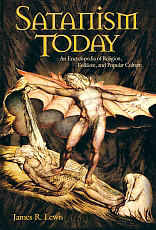
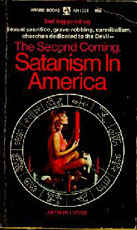 As best anyone can tell, the Black Mass in medieval times was, at most, a dalliance of the rich and famous who had some sort of grudge against the church. As a vehicle for actual worship, it doesn't seem to have actually existed, nor was it used by witches, as the church claimed.
As best anyone can tell, the Black Mass in medieval times was, at most, a dalliance of the rich and famous who had some sort of grudge against the church. As a vehicle for actual worship, it doesn't seem to have actually existed, nor was it used by witches, as the church claimed.
Legends of Satanic rituals quickly took on a sort of glamor that was quite distinct from any realistic practice of Satanism. A good example of this is the Knights Templar. The Templars were deemed Satanic when their wealth and power began to outstrip that of the establishment church during the 14th Century. In a 1308 Inquisition, the church accused the Templars of:
After the Industrial Revolution, occultists like Aleister Crowley, his disciple Jack Parsons and Parsons' disciple L. Ron Hubbard would dabble in the trappings of the Antichrist, but all three understood this to be something completely unconnected to the Satan of the Bible. Crowley and Hubbard especially come off more as sexually frustrated sci-fi writers than minions of the Dark One. Perversely, Satan himself has never really been a key part of Satanism and allegedly Satanic activities. In many ways, it's the least important element. But perhaps that's the root of this story, the Coup d'Ville hiding at the bottom of this Crackerjack box. If Satanism is supposed to be the opposite of Christianity, then its adherents could simply be doing the opposite by refusing to worship its titular deity.
Many Satanists become indignant if you assume that they worship Satan, despite the fact that this is a natural assumption to make about someone who says "I'm a Satanist." They present themselves as secular humanists with a fucked-up sense of humor, who embrace the concept of Satan as a symbol of anti-Christian protest. Some self-professed Satanists are more convincing in this respect than others. Others just kind of come off as kind of fucked-up naifs who don't know what they believe. The trappings of Satanism have a powerful appeal for people in that latter category. The entire concept has a potent magnetism for people with emotional problems who feel like misfits or monsters, and for people who actually are misfits or monsters. Serial killers like Richard Ramirez occasionally profess Satanism, and sometimes live it to a greater or lesser extent.
These cases almost always work the same way. First, there is one report in which a child tells a parent or authority figure something that sounds like "I was forced to take part in a Satanic sex ritual." The report spreads like a mind virus through a community of parents and children connected by a daycare center, scout troop or the like, until there are several reports of abuse or even dozens. The surge in fake Satanism began with the McMartin Preschool case in 1983, which may in fact have been a case of real Satanism. The operators of the preschool were accused of satanically abusing literally hundreds of children, but none of the charges held up in court. Regardless of what went on at McMartin, the incident prompted a nationwide hysteria. Fundamentalist Christians found common ground with crusading liberal child advocates, as almost everyone in the country rushed to stamp out the Satanists in our midst.
Innocently, in the way that children do, they're going to say "yes" every now and then. If the children who say "yes" suddenly and visibly receive a great deal of attention and affirmation, then more children are going to say "yes." Very young children will often believe what they say about such things, especially when asked leading questions by adults, which is called "false memory syndrome." In one California neighborhood, nearly 80 local people were investigated by police for their alleged Satanic activities after one such bout of accusations. Dozens were tried and convicted. The charges ranged from forcing children to drink their own urine to hosting cannibal parties. They did hard time in the state pen until their convictions were overturned for lack of evidence. Some of the kids even retracted their accusations after they got older and started to figure out what was going on. The really heinous thing about these organized witch-hunts during the 1980s and 1990s? Some kids really were subjected to Satanic-style abuse, as later proven by physical evidence. But the Satan-hunters have so thoroughly discredited themselves and muddied the issue that no one even has a clue anymore about how to responsibly deal with charges when they arise.
We have the image of being these satanic followers of rock and roll. But I am a family man. I do care what goes on in the world. It's only an image. It's like Halloween every night for me when I'm on the road. (...) We just entertain, on the darker side of the track. I can speak for myself. I'm not a Satanist. I'm kind of a likable loony.D'oh! Surely Marilyn Manson! Says Manson: Satanism is not about ritual sacrifices, digging up graves and worshiping the devil. The devil doesn't exist. Satanism is about worshiping yourself, because you are responsible for your own good and evil.Nevertheless, Manson calls himself a "Satanist," when he could call himself a "Selfist." OK, what about Glenn Danzig? If you worship Satan, it's a valid religion and should be afforded all the freedoms and rights other religions are offered.All right! Now we're getting somewhere! So, Mr. Danzig, uh, do you yourself... No. I would have to say some of my thinking corresponds with some of the thinking of Satanism. There are parallels between the way I believe and the way other people believe and that does include some Satanists. I don't even know what religion I am. As far as my dark side, I embrace both my light and dark side. I don't feel bad about having a dark side, just as I don't feel bad about having a light side. The two must coexist for me to be myself.Just forget it... Say what you will about the Catholic Church, but it sure is good at eradicating ideas it doesn't like. When even Marilyn Manson won't cop to worshiping Satan, it's a sorry commentary on the state of Satanism.
Timeline
|
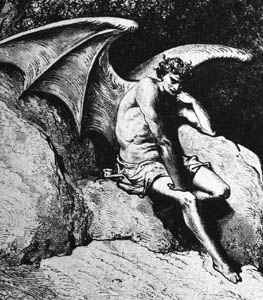 Many Gnostics held to an alternative cosmology in which "God the Father" (the Jewish Yahweh, as understood by the early Christians) was actually a misguided "blind god" named Samael. These sects, while not calling themselves Satanic, could reasonably be considered such, since their belief boiled down to worshiping a God figure who was the professed enemy of the Yahweh.
Many Gnostics held to an alternative cosmology in which "God the Father" (the Jewish Yahweh, as understood by the early Christians) was actually a misguided "blind god" named Samael. These sects, while not calling themselves Satanic, could reasonably be considered such, since their belief boiled down to worshiping a God figure who was the professed enemy of the Yahweh. 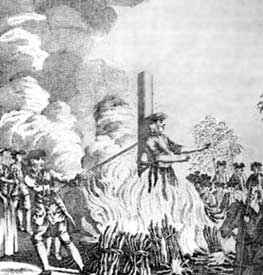 Satan began to take on the familiar qualities of horns and tail in the Dark Ages, modeled on several predecessor pagan gods such as Pan or the Green Man, fertility-style gods who represented everything the Catholics were out to eradicate, such as sex and generally having a good time.
Satan began to take on the familiar qualities of horns and tail in the Dark Ages, modeled on several predecessor pagan gods such as Pan or the Green Man, fertility-style gods who represented everything the Catholics were out to eradicate, such as sex and generally having a good time. 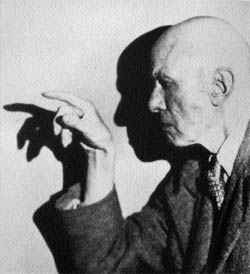 This trend would dominate the history of the movement. Famous figures often tied to Satanic activity or deemed Satanists by critics were entirely uninterested in worshiping Satan. The
This trend would dominate the history of the movement. Famous figures often tied to Satanic activity or deemed Satanists by critics were entirely uninterested in worshiping Satan. The 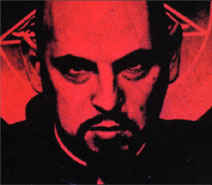 Certainly, that's what modern Satanists want you to believe. In 1969,
Certainly, that's what modern Satanists want you to believe. In 1969, 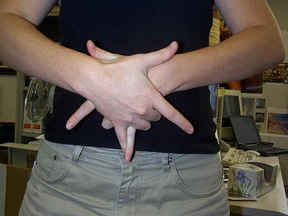 In addition to the faux Satanists like LaVey and Ramirez, there are also the fake Satanists. In recent years, an odd phenomenon of false reporting of Satanic and ritual abuse has cropped up.
In addition to the faux Satanists like LaVey and Ramirez, there are also the fake Satanists. In recent years, an odd phenomenon of false reporting of Satanic and ritual abuse has cropped up.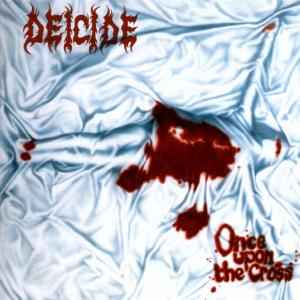 Any responsible parent or schoolteacher can tell you what will happen if you take 20 or 40 very young and impressionable kids in a community and start persistently questioning them about whether anyone has done anything Satanic to them.
Any responsible parent or schoolteacher can tell you what will happen if you take 20 or 40 very young and impressionable kids in a community and start persistently questioning them about whether anyone has done anything Satanic to them. 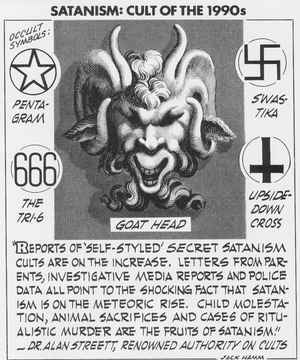 So now that we've established who isn't worshiping Satan, who the hell is worshiping the old boy? Surely
So now that we've established who isn't worshiping Satan, who the hell is worshiping the old boy? Surely 